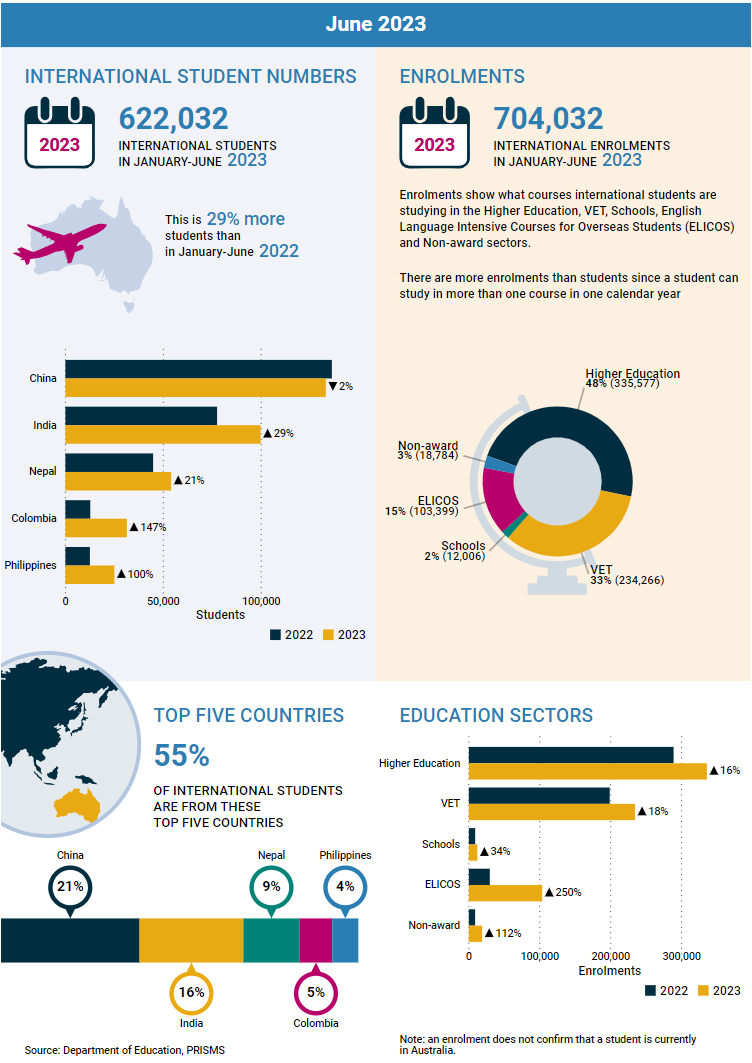Australia’s current immigration boom is driven in large part by India. Although the data lags, we have enough leading indicators to make it well understood:
The Australian government has deliberately engineered this boom by signing two migration deals with India, as well as the Australia-India Migration and Mobility Partnership Agreement, which contains the following provisions:
- Five year student visas, with no limit on the number of Indians who can study in Australia.
- Indian graduates of Australian tertiary institutions can apply to work without visa sponsorship for up to eight years.
- The Mobility Arrangement for Talented Early Professionals Scheme allows 3000 top graduates and early career professionals from India to work and live in Australia for up to two years. They can apply for a permanent skilled visa, and their spouses will be able to work indefinitely.
- Indians can obtain three-month visitor visas for family or commercial purposes (no limit).
The Albanese Government also recently signed the Mechanism for Mutual Recognition of Qualifications, which requires Australia to recognise Indian vocational and university graduates to be “holding the comparable AQF qualification for the purposes of admission to higher education”.
It also requires Australia to recognise Indian vocational and university graduates to “to be holding comparable Australian qualifications for the purposes of general employment, where such qualifications are required”.
The Albanese government is still stoking the boom today via Austrade:
With the Indian press explaining it:
“This improvement was achieved through a $48.1 million allocation of funds over 12 months from the country’s budget, coupled with various measures to address the visa delays. According to reports, almost 600 new staff were recruited between July 1, 2022, and June 30, 2023, and are now supporting temporary and migration visa processing. Processing on-hand visa applications is a government priority”.
But Australia’s India surge pales next to what has transpired in Canada, where Justin Trudeau’s immigration numbers are double Australia’s. This has led to an exploding diplomatic crisis:
Canada said it would reduce the number of diplomats in India due to security concerns, while Prime Minister Narendra Modi’s government appeared to suspend visas for Canadians, as a diplomatic row escalated over the murder of a Sikh activist.
Global Affairs Canada said some diplomats have received threats on social media platforms, part of an unfolding backlash in the South Asian country following Prime Minister Justin Trudeau’s claims on Monday that Indian government agents assassinated a prominent Sikh leader on Canadian soil. New Delhi has called the allegations “absurd” and denied involvement in the June 19 shooting of Hardeep Singh Nijjar, who was pushing for an independent Sikh homeland in India.
The Australian government knows all of the details:
For years, India objected to Western strategists lumping it together with its violent and chaotic neighbour in the phrase “Indo-Pakistan”. Now recognised as a fast-growing giant and a potential bulwark against China, India claims to have been “de-hyphenated”. Yet the explosive charge aired this week by Justin Trudeau suggests that diplomatic recalibration may have gone too far. Canada’s prime minister alleges that Indian agents were involved in the murder in Vancouver of a Canadian citizen sympathetic to India’s Sikh separatist movement. India has long been accused of assassinating militants and dissidents in its own region; never previously in the friendly and orderly West. And though India calls the victim, Hardeep Singh Nijjar, a terrorist, and had offered a reward for information leading to his arrest, he had rebuffed Indian allegations linking him to separatist violence.
India denies everything. But Canada is reported to have shared intelligence about the murder with its allies in the “Five Eyes” pact. None appears to have questioned it. Shortly after Mr Trudeau levelled the charge in Canada’s parliament, America and Britain released cautiously supportive statements, urging India to co-operate with a Canadian probe. The killing, by two unknown gunmen outside a Sikh temple in June, followed a spike in both Sikh separatist activity and at times heavy-handed Indian suppression of it.
But Albo is silent, of course, along with Australia’s entire fake left media:
Australia’s foreign minister Penny Wong claimed to have conveyed the country’s concerns on the developments to India at “senior levels” “Australia is deeply concerned by these allegations and notes ongoing investigations into this matter. Australia believes all countries should respect sovereignty and the rule of law. We are closely engaged with partners on developments. We have conveyed our concerns at senior levels to India,” their spokesperson said in a statement. The statement underlined how the issue could impact Australia with its large Indian diaspora. “We understand these reports will be particularly concerning to some Australian communities. The Indian diaspora are valued and important contributors to our vibrant and resilient multicultural society, where all Australians can peacefully and safely express their views” they added. However, Australian PM Anthony Albanese said on the alliance, “I don’t talk about Five Eyes intelligence at a press conference…we don’t speculate on what intelligence is.”
If this silence prevails, we know exactly what is coming next. Indian students are sensitive to perceptions of safety and welcome, as Australia discovered in 2010 when numbers cratered after several violent incidents. India is now warning students away from Canada:
India is warning its citizens to be careful when traveling in Canada, the latest wrinkle in a row between the countries that began over allegations that India may have been involved in the slaying of a Sikh activist near Vancouver in June.
Indian students are going to dump Canada for Australia, and Albo’s rapidly escalating immigration crisis – in housing, education fraud and excess labour – is going to erupt.




